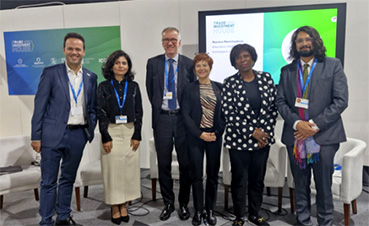On November 20th, during COP29 in Baku (Azerbaijan), the event “Strengthening Trade Sustainability through the Integration of Social and Solidarity Economy (SSE) Entities for a Just Transition” was held, organized by UNCTAD in cooperation with UNTFSSE. At the event, experts from various organizations, moderated by Víctor Meseguer, discussed the role of SSE in achieving a just transition towards a sustainable economy.
Chantal Line Carpentier, from UNCTAD and UNTFSSE, highlighted how SSE—comprising cooperatives, mutuals, and social enterprises—prioritizes people and social purpose over capital. She emphasized that SSE has enormous potential to lead the global green transition in key sectors such as agriculture, the blue economy, renewable energy, the circular economy, and sustainable mobility. Examples included “ejidos” in Mexico, where community ownership manages 83% of biodiversity; cooperatives in Finland and Sweden dominating the forestry market; and the 2,500 federated renewable energy communities under RESCOOP, which bring together 2 million citizens actively participating in the energy transition.
She also underscored cases like the Mondragón cooperative group, which demonstrates that SSE promotes wage equity and democratic governance. With 70,500 workers in 2023, the enterprise generated €11 billion in revenue. Wage differentials within its cooperatives are 1:6, whereas in the private sector they can reach 1:200.
Ertharin Cousin, from Food Systems for the Future (FSF), explained how FSF supports small producers and SSE actors through public policies, financing, and initiatives such as FSF Ventures.
Next, Rishabh Kumar Dhir from the ILO emphasized that SSE can mitigate climate change impacts by creating decent jobs and fostering community resilience. He cited examples such as cooperation between cooperatives in Togo and Italy for the production and distribution of organic pineapples, as well as projects in Peru that combine traditional agroforestry practices with modern techniques.
Niels Peter Nørring, from the Danish Agriculture & Food Council and COPA-COGECA, explained how Denmark implemented a tripartite agreement that includes an agricultural carbon tax and the conversion of farmland into forests. This project funds a voluntary, local, and inclusive process aimed at creating approximately 250,000 hectares of new forests in Denmark, thereby reconverting around 15% of the country’s agricultural land.
Nørring also explained how Arla, one of the largest agri-food cooperatives in the world—representing 13,500 farmers across seven European countries—created the FarmAhead incentive system to reward farmers with better milk production prices for sustainable practices.
Finally, Nurana Mammadova from Education Hub in Azerbaijan discussed the development of an emerging SSE ecosystem in her country and the need for a legal framework to strengthen it. She highlighted the key role of milestones such as the UN Resolution on SSE in driving this economic model toward sustainable development.
The event concluded with remarks by Víctor Meseguer, the moderator. He emphasized that SSE is not merely a legacy or minor player but an essential economic and business model for the future. By democratizing the economy, SSE ensures the inclusion of local communities in the economic and environmental transformations necessary for sustainable development. UNCTAD and UNTFSSE are working to expand SSE projects through international funding, statistics, and appropriate legal frameworks.
The SSE, therefore, emerges as a key business model for a just and sustainable transition, actively involving local communities and ensuring that no one is left behind.







